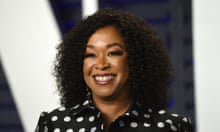There is, Sharon Horgan has said, “a massive overlap” between her life and the TV comedies she has made. “I had nothing, and now I have something, and I managed to cobble together a family and a relationship along the way,” she said in an interview in 2016, “but at the heart of it I’m still a mess, and there’s still just a mess at the heart of all my work.”
A new series of the hit BBC comedy drama Motherland starts on Monday, co-written by Horgan. If there has been a fair amount of Horgan in the main character of hassled, tetchy mother Julia, – played by Anna Maxwell Martin – then there also must be, at least from the outside, some of her in the new character Meg.
Impressive and wildly successful, Meg is a woman for whom motherhood and work are tackled with energy and ease. “I just do what I need to do when I need to do it,” she says. Meg is suspiciously close to “having it all” – though in Horgan’s world, nobody does. Julia looks at her with envy and awe, which is possibly not a feeling unfamiliar to anyone who has been following Horgan’s career.
Horgan is impressive and wildly successful, and gives a good impression of not being a mess: not only has Motherland been commissioned for a third series, but Horgan has written and directed an episode of Modern Love, a romantic comedy anthology based on the New York Times relationship column (as a mark of Horgan’s pulling power, her episode stars Tina Fey). The comedy for which she is probably best known, Catastrophe, ended earlier this year after four series, while Divorce, a show she created for Sarah Jessica Parker, finished in the summer.

“Her work ethic is insane and it was sort of terrifying back at the beginning because my idea of work in those days was to talk about it in the pub, not to actually do it,” says Dennis Kelly, who co-wrote with Horgan the brilliant, excruciating 2006 comedy Pulling, about three, single, thirty-something women which ran for two series and a special before being inexplicably cancelled by the BBC. They also co-wrote the 2016 comedy The Circuit, about the horror of middle-class dinner parties.
The pair met in the early 90s at a youth theatre, then bumped into each other a couple of years later in a pub in north London. He mentioned he had written a play and the next day Horgan phoned him to say they should put it on together. “I honestly think, had I not bumped into her, I wouldn’t have become a writer,” he says, “because I don’t think I’d have had the drive. Sharon always had a lot of drive and was quite fearless.” He says Horgan hasn’t changed much since they first met. “She was funny as fuck. We started working together but it blurred into friendship because she was a lot of fun.”
Horgan was born in Hackney but grew up in Ireland, where her mother is from, on her parents’ turkey farm. After failing to get into drama school, she moved to London, where she did some acting courses and fringe work around other jobs. By the time she met Kelly, she was in her late 20s and wondering if she would have a future in acting. Then they won the BBC’s New Comedy Award, and Horgan has been building a loyal fanbase ever since for her scabrous, unflinching depictions of life and relationships.
There were other shows, including Dead Boss, a 2012 comedy set in a prison, which she starred in and co-wrote, before the success of Catastrophe, which she created with Rob Delaney – they starred as a couple thrown together by an early accidental pregnancy, inspired by Horgan’s own marriage.

“She’s a writer-performer who understands the intentions of her words in a way I hadn’t experienced before,” says Jack Bayles, the producer on Catastrophe and Channel 4’s commissioning editor for comedy. Her writing works, he thinks, because “she’s in tune with the real world. Often you’ll get something that’s trying to feel dramatic and takes a long time to sell you a character or story, and she can move through plot so quickly while still delivering jokes.” Horgan is at a point in her career “where she understands production. She’s more like the US-style ‘showrunner’, and there are not so many of those around.”
Kelly says Horgan is “really truthful” in her work. “That seems to be really important to her. Making people laugh really matters to her as well.
“When we did Pulling we were trying to make sense of what our lives were at that time – we both did shitty jobs we hated, drank way too much and got into ridiculous situations. I think Catastrophe felt like she was trying to make sense of what it was to be a mother, and the discrepancy between what we think we should be when we’re a parent and what we actually are.”
Motherland scrabbles around in the same shadows, though it seems less about being a struggling mother, and more about what it means to be a grown-up – and especially a woman – at that age where life hasn’t lived up to expectations. Helen Linehan, one of Horgan’s co-writers on Motherland, came up with the idea and she and her husband, the writer Graham, took it to Horgan.
The second series is written by four women. “We bounced ideas off each other and shared experiences,” says Linehan. “She’s very generous with her laughter, and making her laugh is like a massive ego boost. She’s good at realistic comedy; it’s not bonkers, it’s usually very relatable.” She has managed to retain that, despite her acclaim and the move into the world of giant US budgets and movie stars. “She’s very down-to-earth,” says Linehan. “I don’t think that her explosive stardom has made her into any kind of insane diva.” Although, she adds with a laugh, “she always has a lovely bag.”
Horgan can come across as guarded in interviews, but Kelly says she has never been interested in creating a high profile for herself. “It never felt like it was about being famous,” he says. “When we were making Pulling, it was about making it the best it could be, about being honest about it.”










